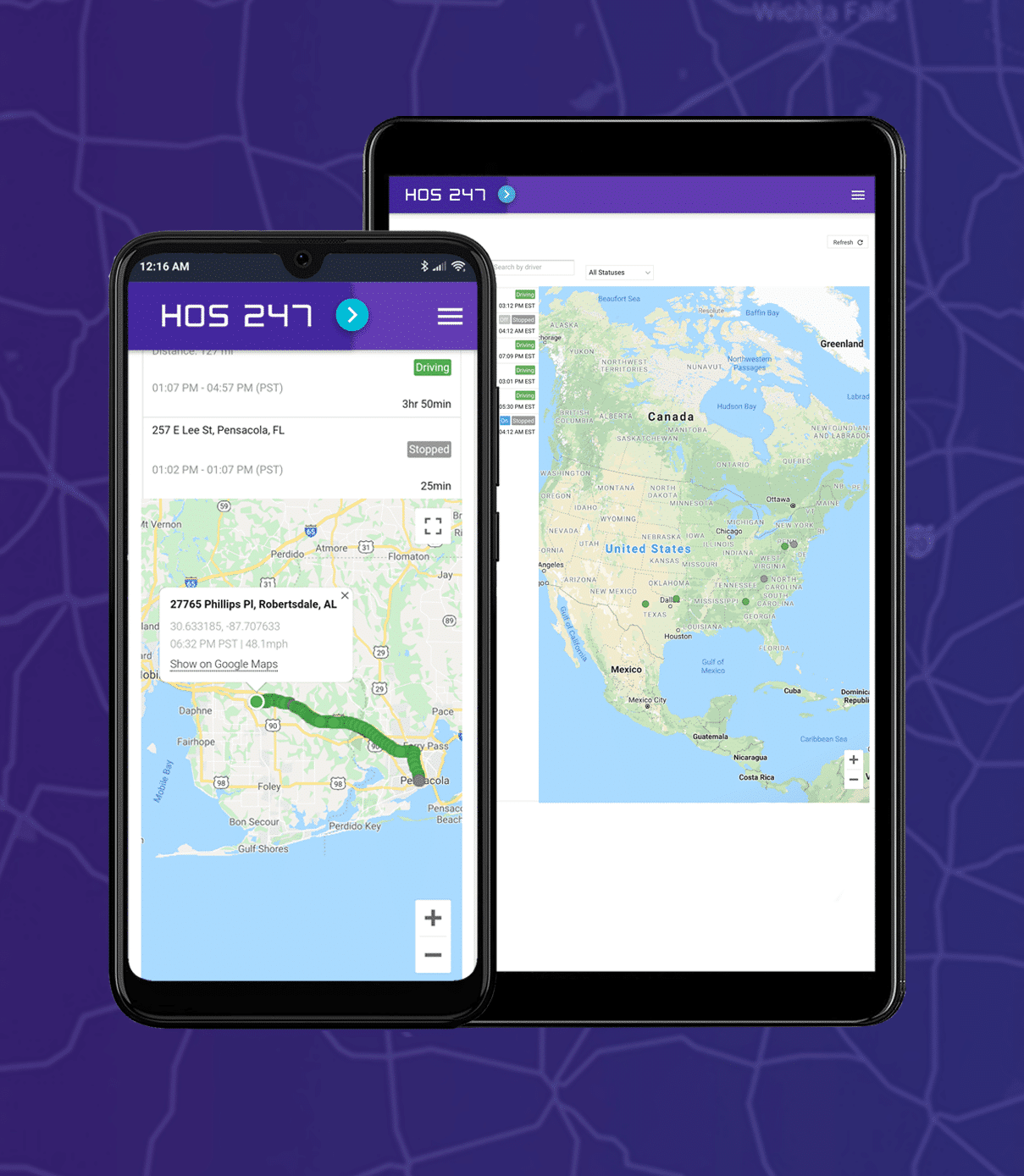The advantages of using GPS trackers are significant, including enhanced safety, reduced fuel costs, increased productivity, and better communication, all of which translate into lower operational costs. By enabling fleet managers to monitor and manage vehicles and assets in real-time, collecting precise and timely data on location, speed, fuel levels, and more, these systems help truckers identify operational gaps and areas of opportunity to take the necessary steps towards maximizing profitability.
In this article, we provide guidance on how to choose the best truck GPS tracking system to meet your specific business needs. We also explore the benefits of using a GPS truck tracking system and its integration with ELD solutions to streamline fleet management and compliance reporting.
Do you have any questions? Talk to ELD Advisor: 650-405-3372 or Request Callback
Understanding GPS Tracking Technology in Trucking
GPS tracking technology has revolutionized the trucking industry, transforming fleet operations from simple location monitoring to comprehensive management systems. Modern GPS tracking solutions provide fleet managers with real-time data on vehicle location, performance, and driver behavior. Let’s explore the core aspects of this technology:
- Hardware installation. Commercial GPS tracking devices connect directly to a truck’s engine control module (ECM) through the diagnostic port, enabling access to critical vehicle data beyond basic location information.
- Data transmission. The tracking device collects information from the vehicle and transmits it via cellular networks to cloud-based servers, where it’s processed and made available through management software.
- Real-time monitoring. Unlike basic navigation systems, commercial truck GPS trackers provide continuous updates on vehicle location, speed, engine performance, and driver behavior.
- Comprehensive integration. Modern systems connect with multiple vehicle systems to gather detailed diagnostic information, fuel consumption data, and engine parameters for complete operational visibility.
- Cloud-based analytics. Advanced software platforms analyze the collected data to generate actionable insights on route efficiency, driver performance, maintenance needs, and regulatory compliance.
This sophisticated integration of hardware and software creates a powerful tool that gives fleet managers unprecedented visibility into their operations, enabling data-driven decisions that improve efficiency and reduce costs.

Evolution of Trucking GPS Technology from Basic Location Tracking to Comprehensive Fleet Management
The journey of GPS technology in trucking represents a remarkable evolution from simple tracking devices to sophisticated management platforms.
- First generation (early 2000s). Early systems provided basic location information with limited accuracy and required manual downloads of data for offline analysis.
- Second generation (2005-2015). Improved systems offered more frequent position updates, basic vehicle diagnostic information, and simple reporting tools for route history.
- Current generation (2015-present). Modern solutions feature real-time tracking with 4G/LTE connectivity, comprehensive diagnostics, driver behavior monitoring, and integration with compliance solutions.
- AI and predictive analytics. Today’s advanced systems leverage artificial intelligence to predict maintenance needs, optimize routes based on traffic patterns, and identify driver coaching opportunities.
- Integrated compliance solutions. Modern GPS tracking systems seamlessly integrate with ELD solutions to simplify hours-of-service tracking, DVIR reporting, and IFTA calculations.
This evolution from basic tracking devices to comprehensive fleet management platforms has transformed GPS technology from a convenience into an essential operational tool that directly impacts a carrier’s bottom line.
Difference Between Consumer GPS and Commercial Fleet Tracking Systems
While they may appear similar at first glance, consumer GPS devices and commercial fleet tracking systems have fundamental differences in their capabilities and applications.
- Hardware durability. Commercial GPS trackers are built with ruggedized components designed to withstand the vibrations, temperature fluctuations, and harsh conditions common in trucking operations.
- Integration capabilities. While consumer GPS focuses on basic navigation, commercial systems integrate with vehicle diagnostics, ELD solutions, maintenance scheduling, and fuel management systems.
- Reporting functions. Commercial systems offer comprehensive reporting on driver behavior, vehicle utilization, maintenance needs, and compliance metrics that aren’t available in consumer GPS units.
- Management features. Fleet tracking systems include tools for geofencing, driver performance monitoring, maintenance alerts, and IFTA mileage reporting not found in consumer navigation devices.
- Data accuracy. Commercial systems utilize more sophisticated positioning technology and more frequent updates to ensure precise location tracking for large commercial vehicles.
These differences make commercial tracking systems like HOS247’s solution significantly more valuable for trucking operations, providing the comprehensive data needed to optimize fleet performance and ensure regulatory compliance.

Choosing the Best Trucking Tracking System
With so many options available, selecting a quality GPS tracking device for trucks can be an overwhelming task. However, with the right considerations in mind, motor carriers can make an informed decision that will benefit their fleet’s overall performance. So, what are the crucial factors to consider when looking for the best truck GPS tracking system?
- Hardware compatibility. Consider the compatibility of the tracking hardware with your entire fleet, including trailers, light-duty trucks, medium-duty trucks, pick ups, etcetera. It is important to look for a GPS tracking device for trucks of all types to provide seamless integration and maximum coverage across your entire fleet.
- Effortless installation. Opt for a GPS tracker that offers easy and hassle-free installation to minimize any additional costs and prevent downtime.
- Real-time tracking. Some trackers might offer periodic updates to save on battery power. However, these systems might now allow carriers to profit from the full range of benefits that can be gained from real-time visibility. Select a GPS tracker that provides real-time updates on the location of your vehicles to ensure better fleet security and have full visibility of your operations.
- Efficient technical support. Look for a provider that offers efficient and reliable customer support to help you with the implementation of the GPS truck tracking system, optimize your fleet’s performance, and troubleshoot any issues that may arise.
- Ease of use. To ensure the successful implementation of the tracker and manage the complex technology seamlessly, it’s important to choose a user-friendly software with an intuitive fleet manager portal. The best truck GPS tracking systems should be intuitive and straightforward, making it easy for anyone on your team to adapt to the system and take full advantage of its benefits.
- 4G technology. One of the primary benefits of 4G technology is faster data transfer rates compared to 3G, resulting in more accurate and up-to-date location information.
- Demo or trial period. Ask potential providers for a demo or trial period to test the device’s performance and ensure it is the right fit. By doing so, you can make an informed decision that will help you optimize fleet performance and improve your bottom line.
Now that we have reviewed the main characteristics that define the best truck GPS tracking systems, it’s time to introduce you to a dependable solution that can significantly improve your trucking operations.
Benefits of HOS247 4G GPS Truck Tracking System
HOS247 is a reliable and efficient option for motor carriers seeking the best GPS tracking system. With years of experience offering trucking solutions, HOS247 is committed to providing unparalleled services that help fleets save money and keep drivers safe. By relying on HOS247, motor carriers can reduce costs on vehicle-related expenses (such as fuel wastage and reparations), making it a wise investment for trucking businesses. We offer 4G GPS tracking in real time with top-rated technical support to help carriers grow their business. In this section, we will explore the benefits of our system and how it can contribute to better fleet operations.
Drive Down Your Costs
The HOS247 GPS truck tracking system provides valuable insights that can significantly reduce fuel costs. Fleet managers can access an idling report on the portal to identify wasteful behaviors and take corrective action to prevent the unnecessary fuel usage. In addition to fuel cost savings, the tracker can also provide cost savings in terms of vehicle maintenance. By monitoring a vehicle’s engine diagnostics and providing alerts when maintenance is required, fleet managers can proactively address issues before they lead to unexpected breakages, reducing repair costs and vehicle downtime.
Enhance Fleet Safety and Security
HOS247 trackers can be hidden inside a vehicle to help recover stolen vehicles and assets. In the event of an accident, the solution provides valuable information about the incident, allowing fleet managers to take necessary action and potentially reduce liability issues. Additionally, the HOS247 GPS truck tracking system ensures that fleet vehicles are always road-ready by notifying personnel when maintenance is due.
Install Your Tracker in Minutes
HOS247 offers a straightforward tracking solution that saves time and simplifies the installation process. We provide easy-to-follow installation instructions that require complicated wiring, in-person visits, or special tools. In 10 minutes, the tracer will be ready to go, and with just a simple login from a standard internet browser, managers can access the portal to start supervising operations in real time.
Improve Your Customer Service
Our GPS tracking system for trucks allows dispatchers to pinpoint the location of each vehicle in real-time to assign loads to the nearest driver, speeding up delivery times and improving customer satisfaction. Supervisors can also provide more accurate information on arrival times to the customer, enhancing their experience with the company. In case of any disputes or misunderstandings, fleet managers can rely on the GPS data to confirm when a truck arrived at a site and when it left.
Enhance Compliance with the ELD Law
HOS247 GPS trackers can be integrated with an electronic logbook to keep driver logs in accordance with federal requirements. Our solution collects all relevant information about the driver’s status, drive-shift-and-cycle time left, violations, and more, making it easier for operators to manage their digital driver log books, achieve FMCSA compliance, and prevent HOS-related fines.

Advantages of ELD-Integrated GPS
If your fleet is involved in interstate commerce, complying with ELD regulations is critical. Integrating the functionality of electronic logging devices with a GPS tracking system can offer even more benefits for fleet managers. Let’s see how ELD integrated trackers can streamline your operations and improve compliance with regulations. Using this system, truckers are able to:
- Achieve compliance with FMCSA regulations and avoid fines for HOS violations and higher CSA scores.
- Streamline fleet management operations by using a single provider for both GPS and ELD functionality.
- Improve dispatch by tracking the driver’s location plus their available driving time.
- Generate comprehensive reports on idling, vehicle diagnostics, and IFTA mileage.
- Manage digital driver log books and inspection reports with ease.
- Enhance overall fleet management experience and productivity.
HOS247 offers a GPS tracker that can be fully integrated with an ELD system to facilitate compliance and provide fleet managers with valuable insights, helping them make informed decisions. In the next section, we will discuss what makes HOS247 services suitable for carriers looking for the best truck GPS tracking and ELD system on the market.
HOS247 Is a Top-Rated Fleet Management Provider
HOS247 is a top-rated provider thanks to our unwavering commitment to offer reliable and efficient solutions backed by exceptional customer support. Below are some of the reasons why our service is highly rated by truckers:
- Durable hardware. We have carefully chosen a single hardware option for its quality and reliability, and our software is specifically tailored to ensure a stable connection and accurate data recollection. We replace our hardware for free during the first year if it presents any malfunctions.
- Excellent customer service. We understand the importance of being a strategic partner in helping our clients’ businesses grow. Our dedicated customer support team consists of multilingual professionals who speak English, Russian, and Spanish and are available seven days a week to answer any questions drivers or fleet managers might have. Independent reviews on platforms such as Google Play and the Apple Store highlight the trustworthiness and user-friendliness of our electronic logbooks, as well as the high quality of technical support that we provide.
- Complementary features. HOS247 offers features to help fleet managers streamline their operations and improve their bottom line. Along with reliable and compliant RODS functionality, the ELD+GPS system includes fleet maintenance and vehicle diagnostics, which can help reduce maintenance costs and keep vehicles running smoothly. Additionally, the accurate IFTA mileage calculations can save time and reduce the risk of errors when filing taxes.
At HOS247, we are dedicated to helping our customers achieve compliance effortlessly, so that they can focus on boosting their profitability. The consistently high ratings we receive from our users are a testament to the quality of the services we offer. If you are in search of a GPS or ELD provider, HOS247 is a reliable option worth considering. Start enjoying the benefits of our system by ordering a fully refundable demo.
ELD Benefits Beyond Regulatory Compliance
While electronic logging devices are primarily implemented for hours-of-service compliance, their integration with GPS tracking creates a powerful system that delivers benefits far beyond basic regulatory requirements. This combination transforms compliance from a cost center into a strategic advantage for forward-thinking fleets.
When ELDs and GPS tracking systems work together, they create a comprehensive compliance solution that addresses multiple regulatory areas simultaneously. The GPS component enhances the elog’s capabilities by providing precise location data that validates driver logs while collecting additional information that supports broader compliance efforts.
The impact on FMCSA compliance extends well beyond hours-of-service monitoring. Integrated systems provide critical data for multiple compliance areas:
- Improved driver qualification monitoring through automated tracking of driving time, training requirements, and medical certification deadlines
- Enhanced vehicle maintenance compliance with automated diagnostic monitoring and maintenance scheduling based on actual usage
This integration particularly shines in its effect on CSA scores. GPS fleet tracking helps improve scores across multiple BASIC categories by monitoring unsafe driving behaviors, preventing HOS violations, and ensuring proper vehicle maintenance. With better CSA scores, carriers avoid costly interventions, maintain lower insurance rates, and present themselves as reliable partners to potential customers.
Beyond federal requirements, the GPS-ELD combination helps manage state-specific regulations and weight restrictions. Quality systems can be configured to alert drivers and managers when approaching state borders or restricted routes, helping navigate the complex patchwork of state regulations that carriers must follow.
Perhaps most importantly, integrated systems provide comprehensive documentation that protects carriers during audits and investigations. Rather than scrambling to collect records from multiple sources, fleet managers can quickly generate complete compliance reports showing driver logs, vehicle maintenance histories, and safety performance data from a single integrated system. This documentation capability alone can save countless administrative hours and prevent costly violations.
As regulatory requirements continue to evolve, integrated GPS-ELD systems with regular software updates ensure fleets can adapt quickly to new compliance mandates without replacing hardware or disrupting operations. This future-proofing aspect represents an increasingly valuable benefit as the regulatory landscape becomes more complex each year.

GPS Tracking and Driver Experience
Despite initial concerns, properly implemented GPS tracking systems can actually enhance the driver experience, improving safety, efficiency, and job satisfaction.
How GPS Tracking Improves Driver Safety and Satisfaction
When presented as a support tool rather than surveillance, GPS tracking offers numerous benefits for professional drivers:
- Evidence-based coaching. Rather than generic safety training, GPS data enables personalized coaching focused on specific behaviors that need improvement, making training more relevant and effective.
- Reduced phone calls. With real-time visibility into vehicle location, dispatchers can dramatically reduce the number of check-in calls to drivers, allowing them to focus on the road without interruptions.
- Fair performance evaluation. Objective data provides a fair basis for performance evaluation, replacing subjective assessments with measurable metrics that recognize driver achievements.
- Emergency assistance. In case of an accident, breakdown, or medical emergency, GPS tracking enables rapid response to the driver’s exact location, potentially saving lives in critical situations.
Addressing Common Driver Concerns
Successfully implementing GPS tracking requires addressing driver concerns honestly:
- Privacy protection. Clear policies about what data is collected, how it’s used, and especially what happens during non-working hours are essential, particularly for drivers who take vehicles home.
- Focus on improvement, not punishment. The most successful GPS implementations emphasize using data for overall fleet improvement rather than punishing individual mistakes.
- Recognition programs. Many fleets use GPS data to identify and reward safe driving behaviors, creating positive incentives rather than focusing solely on violations or errors.
By establishing transparent policies and demonstrating tangible benefits for drivers, fleet managers can transform potential resistance into support, creating a culture where GPS tracking is viewed as a valuable tool that benefits everyone in the organization.

Conclusion
GPS tracking technology has evolved from simple location monitoring to become an essential component of modern fleet management. Today’s solutions offer comprehensive tools for improving efficiency, reducing costs, enhancing safety, and maintaining regulatory compliance. For trucking operations seeking to remain competitive in an increasingly challenging market, implementing a quality fleet tracking system is no longer optional but necessary.
HOS247’s 4G GPS truck tracking system represents the culmination of this technological evolution, offering a reliable, user-friendly solution that addresses the specific needs of trucking operations. With real-time tracking, advanced diagnostics, and seamless integration with ELD solutions, HOS247 provides the tools fleet managers need to optimize operations and improve their bottom line.
The future of trucking will continue to be shaped by advancements in tracking and telematics technology. Fleets that embrace these tools and use the resulting data to drive continuous improvement will be best positioned for success in an increasingly competitive and regulated industry. By selecting a trusted provider like HOS247, carriers can ensure they have the technology foundation needed to thrive today and adapt to the challenges of tomorrow.

As an expert in B2B and B2C sales, I’ve dedicated myself to perfecting sales processes and client retention strategies in the logistics and trucking industry. I have significantly contributed to the expansion of the ELD service, catering to retail and wholesale clients in need of HOS247 ELD solutions. My unwavering commitment to implementing state-of-the-art sales techniques and technologies ensures the continuous growth and success of businesses I work with.












Reliable electronic logging devices (ELDs) have become essential equipment for today’s truckers. Since the federal mandate took effect, these devices have moved from optional technology to required tools for staying compliant and running efficiently. The ELD mandate changed how you

Carriers can turn the ELD requirement into an advantage by choosing an electronic logbook with the right qualities for their business. There are some must-have features to achieve federal compliance, and some others are not mandatory but can prove useful

Long-haul trucking is the backbone of America’s supply chain, but staying compliant with federal regulations while navigating tight schedules can be challenging. The ELD mandate, enforced by the Federal Motor Carrier Safety Administration (FMCSA), requires most commercial motor vehicle operators